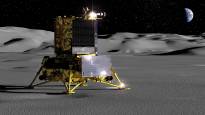Luna-25 is expected to land on the Moon around August 21.
Early Friday morning, Russia launched a Soyuz rocket carrying the unmanned Luna-25 space probe. This is Russia’s first hearing flight since 1976.
Based on the images sent by the Russian space agency Roskosmos, the rocket took off from the Vostotshnyi space center in the early hours of the morning a little after 2 am Finnish time. Luna-25 is scheduled to head near the Moon’s south pole. Most of the previous probes sent to the Moon have landed on the moon’s equatorial region.
The spacecraft is scheduled to reach lunar orbit in five days. After this, it takes about 3-7 days to choose the right place before landing in the Moon’s south pole area. Roskosmos expects Luna-25 to land on the Moon around August 21, a source from the agency told news agency AFP.
The purpose of the probe is to spend a year on the surface of the Moon, during which it will, among other things, take samples from its surface and conduct scientific experiments.
The space program continues despite the sanctions
The launch is the first mission in Russia’s new moon program, launched by the country at a time when Roscosmos has been isolated from its normal partners due to Russia’s war of aggression in Ukraine. Due to the boycott of Western countries, Russia has increased its space cooperation with China. Among other things, the European Space Agency Esa recently announced that it is not involved in the Luna-25 project or the subsequent Russian space flights. Russia has said that it replaced Esa’s equipment on the Luna-25 flight with Russian-made equipment.
President Vladimir Putin has promised to continue Russia’s space program despite sanctions imposed by Western countries. In his comments, he has referred to the fact that the Soviet Union sent the first man into space in 1961, when the relationship between East and West was particularly tense.
The flight that took off on Friday is important for Russia’s space program, which is suffering from funding problems, corruption scandals and increased competition. In addition to the more usual competitors the United States and China, private space companies such as the billionaire Elon Musk’s SpaceX.
Source: AFP
